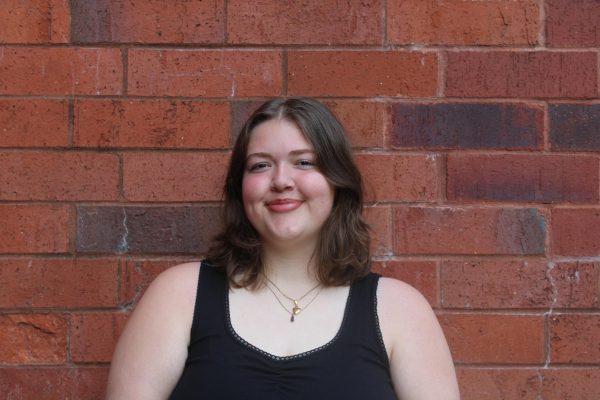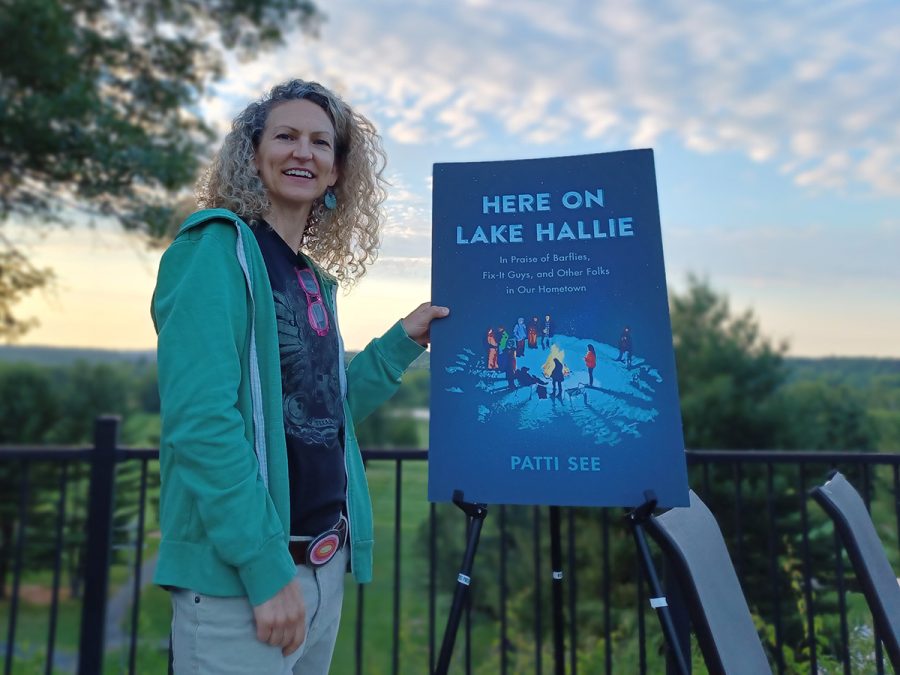Life ‘Here on Lake Hallie’
Patti See on her new book, writing and going on a Tavern Tour
Photo by Wisconsin Historical Society
See said this tight-knit lake community served as an inspiration for the essays compiled in her most recent book.
In Lake Hallie, Patti See can see from her house to her neighbor’s house across the lake, with 79 acres separating them. There is an abundance of kayakers, anglers and stand-up paddle boards she gets to know when they drift past her house.
See said this tight-knit lake community served as an inspiration for the essays compiled in her most recent book.
“Here on Lake Hallie: In Praise of Barflies, Fix-It Guys and other Folks in Our Hometown” was published on May 10, 2022, according to publisher Wisconsin Historical Society Press.
See, who grew up in Chippewa Falls, said she never saw herself staying in the Midwest, much less putting down roots so close to her childhood home.
“One of the things I write about in my book is that I could not wait to get away,” See said. “It’s just ironic that I now live on Lake Hallie which is about 10 minutes from the house I grew up in and it’s right across the lake from where my best friend grew up.”
See said the essays in the book are not just about the people and experiences on Lake Hallie, but also about Chippewa Falls and Eau Claire, where she has worked as an academic advisor in the Advising, Retention + Career Center at UW-Eau Claire since 1994.
In addition to advising, See teaches classes on masculinity studies and contemporary feminism for the women’s gender and sexuality studies department and a life writing class for the honors program.
“I do enjoy teaching, but one of the things I appreciate about (advising) is that I can see students one-on-one and really get to know them, and then also spend time in the classroom,” See said. “It’s fun to have that balance.”
Between advising and teaching, See makes time for writing, which is incredibly important to her.
See regularly writes the Sawdust Stories column for the Eau Claire Leader-Telegram. Many of her columns were included in her book, but See said compiling them wasn’t something she initially planned on doing.
“When I first started writing the Sawdust Stories column, I thought ‘I’m going to run out of ideas. That’s a lot of pressure,’” See said. “That was my initial thought before I even wrote my first one and now I never feel like that because there are stories everywhere.”
As time went on, See noticed many of the articles in the column were about Lake Hallie and her family, and readers were making connections with the topics of her writings.
“I think readers really enjoy reading about family and neighborhoods, in some ways because people want that in their lives or they can identify because they have that in their lives,” See said.
See, the youngest of eight children, said she grew up in a family of storytellers. Growing up hearing those types of cadences and learning how to tell a good story is very valuable to her as a writer.
She recalled having a poetry unit in fifth grade and her teacher, Miss Jeanette Prince, said she should consider being a poet when she grows up.
“I still think about that, what a gift that she was so encouraging,” she said. “Who says that to a 10-year-old, you know? It’s just so sweet and wonderful.”
While “Here on Lake Hallie” is prose, See continued to write poetry after Prince’s encouragement and published “Love’s Bluff” — a collection of poems with similar themes about family, love and community.
“I think beginning my career as a poet just makes me more focused on concrete detail and choosing exactly the right word,” See said.
See said she also had encouraging teachers and professors as mentors during her years in high school and college. These mentors were nurturing to her, but were also “straight-talkers.”
See also recalled writing about a neighbor who had died and her professor wrote “Someone died? Who cares? Make me care.”
“So, when I write about sentimental things, I don’t want to be sappy, I don’t want to be over-the-top and that was a great lesson,” See said. “It stung a little bit at 21, but boy, that lesson has served me well for many years and years.”
See’s advice for writers — especially for young writers or writers just starting off — is to commit to making time for writing.
She said she loves writing, but other aspects of life often get in the way. See said she has to be conscious of making time for her writing, and she finds pockets of time within her life.
Every morning, See said she edits and sketches out her writing while on her exercise bike. She also likes to keep a printed copy of what she is working on, so she can pull it out and work on the go.
“So I just taught myself to use those little pockets,” See said. “That’s not to say I don’t have really structured time where I concentrate and I focus, I do that as well. I also just try to use pockets of time.”
Instead of a traditional book tour, See does what she likes to call a “Tavern Tour” and connects with her readers at local bars and breweries. The next stop on her Tavern Tour will be at 6 p.m. on Thursday, Nov. 10 at 200 Main Art & Wine.
“At those, I hear from so many people in the community that identified with my dying parent stories or my stories about my own children or my sibling stories or growing up in the 1970s and 1980s,” See said. “People just love to tell me their version of events that might be tied to a topic that I wrote about. That’s really, really fun.”
See said patrons can expect half an hour of drinks and a meet and greet. Then See will read one short piece and tell a few stories, followed by more drinks and mingling.
She’s not sure what essay she will read on Thursday, but See said she likes to read different essays and tell different stories at each stop on the Tavern Tour.
See said she has never read the story of how she got married to her husband — the first chapter of the book — on the tour, and is considering it for this event.
When choosing an essay, she also likes to try to tie the piece to the venue. When See stopped at The Brewing Projekt, she told stories about owner Will Glass’s grandma, Freddie Glass Jensen.
She enjoys these events because she can tell the “front-story and backstory” for the essays.
“There’s always more that you can’t include, or not just for lack of space but sometimes people tell me really hilarious and inappropriate things, which I shouldn’t write about but can tell the story about it,” See said.
“Here on Lake Hallie” is available for purchase on the Wisconsin Historical Society Press’s website and at major bookstores.
Kasper can be reached at kasperml9306@uwec.edu.

Maddie Kasper is a fourth-year journalism and political science student and this is her seventh semester at The Spectator. She covered the UW-Eau Claire Student Senate for three consecutive semesters and dreams of being a national political correspondent, but also loves sports photography. She adores poems about oranges, obsessively logging movies on Letterboxd and the Half Price Books on the east...


